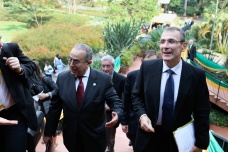Commissioner Piebalgs pushes for tangible results on maternal and child health at the African Union Summit

From 24th to 26th July, European Commissioner for Development, Andris Piebalgs, will address the 15th African Union (AU) Summit in Kampala, Uganda. Maternal, infant and child health will be the core theme of the meeting gathering the 53 African Union Member States. The EU Commissioner will stress the need for concrete progress in these areas. Among the eight Millennium Development Goals (MDGs), child and maternal health (MDGs 4 and 5) are those where many developing countries are most off track. This is important as both Africa and the EU are preparing for the High Level Summit on MDGs that will take place in New York on 20-22 September.
Ahead of his trip, Commissioner Piebalgs said: "Today 11 million children under the age of 5 and more than half a million pregnant woman die in the world every year. Saving these children, protecting the mothers and promoting the right to health for everybody are priority objectives for the EU. We are all committed to reducing these shocking rates by two thirds by 2015, but progress is too slow. I am pleased that the African Union puts the health of the most vulnerable children and women at the centre of this Summit and that we can speed up the process to meet the relevant Millennium Development Goals on time."
Commissioner Piebalgs attends this Summit as African Union is one of the privileged partner of the EU, notably in the development policy area. In his address to the Summit, he will welcome the new momentum and stress the need to progress from shared declarations and plans to dedicated action and delivering results. He will further underline the work of the EU in improving maternal and child health. The financial contribution of the European Commission in this area is currently €310 million per year. The funds go into strengthening health systems and universal access to health care. In addition, the Commission contributes €100 million per year to the Global Fund to Fight AIDS, Tuberculosis and Malaria (GFATM). As part of the 7th Framework Programme for Research and Development, the EU supports research on mother and child health as well as sexual and reproductive health (€20.5 million to date).
On the eve of the AU Summit (24 July), Commissioner Piebalgs will also participate in a Dialogue on Health Financing in Africa where African Health and Finance Ministers will be present. Commissioner Piebalgs will stress the need to make faster progress in delivering on the 2001 commitment of the African Union Heads of State to spend 15% of annual budgets on health and to work towards replacement of out of pocket payments with other more equitable financing mechanisms.
For large parts of the African continent, the statistics are still not meeting the target. Maternal mortality rates, for example, have remained stable in most sub-Saharan countries, at a level that is 200 times higher than in Europe. In recent years, the African Union has approved a series of initiatives addressing Maternal Health and Child Mortality and also the control of HIV/AIDS (MDG 6), Malaria and other major diseases. In May, African Health Ministers met in Geneva where, among other things, they reaffirmed their determination to increase health expenditure to 15% of national budgets and to earmark an amount for maternal, newborn and child health. At UN level, the slow progress with MDGs 4 and 5 has led to renewed commitments on maternal and child health through the G8 Muskoka initiative and the Joint Action Plan proposed by the UN Secretary General to be adopted at the MDG High Level Meeting in September.
Background
The African Union is composed of 53 countries. In 2007, the EU and the African Union adopted a Joint Africa-EU Strategy (JAES). The Strategy reflects the will of 80 Heads of State and Government from Europe (27) and Africa (53) to redefine the relations between the two continents in the framework of a Strategic Partnership to tackle together global challenges, such as Climate Change, governance, peace and security, migration, research and technology, etc.
For further information:
On 31 March 2010, the European Commission adopted a communication on the role of the EU in global health:
An example of the many
activities ![]() of the European Commission in support of sexual and reproductive
health and rights:
of the European Commission in support of sexual and reproductive
health and rights:
More information on the Africa-EU partnership:















